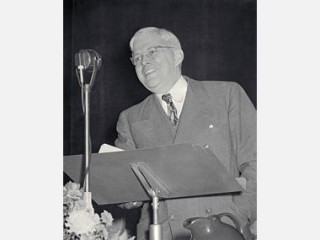
Charles E. Wilson biography
Date of birth : 1890-07-18
Date of death : 1961-09-26
Birthplace : Minerva, Ohio, U.S.
Nationality : American
Category : Arhitecture and Engineering
Last modified : 2011-02-09
Credited as : Engineer, CEO of General Electric, U.S. secretary of defense
Charles Erwin Wilson, engineer, businessman, and secretary of defense during the Eisenhower administration, is popularly remembered for his remark comparing the welfare of the United States with that of General Motors Corporation.
Charles E. Wilson was born in Minerva, Ohio, on July 18, 1890. At the age of four Wilson moved with his family to Mineral City, Ohio. There he struck up a boyhood friendship with two railroad engineers who frequently took Wilson on the local railroad and showed him how the new Westinghouse air-braking system worked. Fascinated with mechanics, he enrolled at the Carnegie Institute of Technology and completed the four-year program in three years, graduating near the top of his class.
After graduation, Wilson employed his engineering skills first at Westinghouse Electric and then at Remy Electric, a subsidiary of General Motors. At Remy he rose from chief engineer to president and oversaw the company's merger in 1926 with Delco. As head of Delco-Remy of Anderson, Indiana, Wilson and his 12,000 employees produced the ignition systems for General Motors automobiles.
Promoted by General Motors to corporate headquarters in Detroit, Wilson again rose rapidly and became president of the mammoth company in 1941. During World War II Wilson helped transform General Motors into the nation's chief producer of war materiel. Between 1941 and 1945 the company built one-fourth of U.S. tanks, armored cars, and airplane engines and one-half of the machine guns and carbines.
Wilson's industrial management skills were also evident in employee relations. During the 1930s auto workers conducted a series of strikes against General Motors because the company refused to recognize their right to organize unions and bargain collectively. Wilson, however, negotiated labor peace with the United Auto Workers union and its leader, Walter Reuther. During contract negotiations in 1948 and 1950 General Motors agreed to tie workers' salaries to the rate of inflation, the so-called "escalator clause," to award raises for increased worker productivity; and to establish a company-wide pension plan. Thereafter, other industrial corporations would negotiate labor contracts with features similar to those that Wilson and Reuther designed.
Impressed by Wilson's managerial abilities, President-elect Dwight Eisenhower asked Wilson in late 1952 to take charge of the government's largest agency, the Department of Defense. But compared to his business career, Wilson's tenure as secretary of defense (1953-1957) was controversial. A blunt, outspoken man, Wilson seemed uncomfortable in a political world. His public comments left the impression that he was an insensitive tycoon. Wilson's most difficult moment came in 1953 when, during congressional testimony, he declared: "What was good for our country was good for General Motors and vice versa."
As secretary of defense, Wilson played a limited role in shaping the nation's military policies. In view of his vast military experience, President Eisenhower decided that he would set defense policies. Eisenhower expected Secretary Wilson to carry out his detailed instructions and to run his department in an efficient and business-like manner.
As commander-in-chief, Eisenhower chose to streamline the Department of Defense's budget by reducing manpower and basing the nation's defense on atomic weaponry, a policy tagged "more bang for the buck." Critics within the Pentagon and Congress charged that these policies left the nation incapable of waging conventional and guerrilla wars. Because he had to defend these policies in public, Wilson was often blamed for them. Eisenhower, on the other hand, complained to aides that Wilson should have quelled dissent within the Pentagon.
Secretary Wilson resigned from Eisenhower's Cabinet in late 1957. He returned to the board of directors of General Motors and also served as chair of a civil rights commission in Michigan. Charles E. Wilson died in his sleep of a coronary thrombosis on September 26, 1961, at his plantation near Norwood, Louisiana.
















